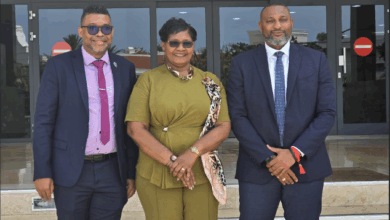(CARICOM Secretariat, Turkeyen, Greater Georgetown, Guyana) Secretary-General of the Caribbean Community (CARICOM) His Excellency Edwin Carrington welcomed the signing of a Memorandum of Understanding (MOU) between the Caribbean Centre for Development Administration (CARICAD) and the CARICOM Implementation Agency for Crime and Security (IMPACS) at the conclusion of a two-day Meeting he hosted with Heads of Community Institutions at the CARICOM Secretariat, Georgetown, Guyana.
The signing was conducted shortly before a press conference last Thursday to apprise the media of the outcome of the Meeting.
The Secretary-General said that harmonising the work of CARICOM Institutions was one of the ways to move the integration movement forward and ultimately to ensure its success.
“It is an achievable task,” he said.
Under the MOU, CARICAD and IMPACS would cooperate in the area of training for frontline officers so that they would be suitably equipped to deter those who pose threats to their countries and to the Region, Ms. Lynne Anne Williams, IMPACS Executive Director said after affixing her signature to the document.
This area of functional cooperation and harmonisation of training was also expected to reduce public dissatisfaction with immigration services across the Region, Ms. Williams said.
Ms. Jennifer Astaphan, Executive Director, CARICAD who signed the MOU on behalf of her institution, pointed to the significance of collaboration of Regional institutions and noted that such cooperation could lead to garnering much needed resources and the strengthening of capacity. In the context of the CARICOM Single Market and Economy (CSME), Ms. Astaphan said that CARICAD could identify critical areas of need and coordinate efforts with other regional institutions.
Echoing remarks made by the Secretary-General at the formal opening of the two-day Meeting with the Heads of the Regional Institutions, Ms. Astaphan said integration was not for the faint-hearted “but if we pull our strings together, we can achieve much.”
Prior to the Meeting, cluster workshops were held on Agriculture, Climate Change and Water Management, Air Transportation and Security. Recommendations from those workshops were presented to the full Meeting.
Secretary-General Carrington described the forum as “very valuable”, with “robust and meaningful discussions” on the way forward.
With regard to Agriculture, the Meeting considered approaches to mitigating to rising cost of food, particularly in the short-term. According to Dr Arlington Chesney, Executive Director, Caribbean Agricultural Research and Development Institution (CARDI), a list of commodities on which priority action should be taken to address the Region’s food import bill included cereals, meat, potatoes and rice. Substitute for cereals could be found in cassava; alternatives in meat could be small ruminants, poultry and fish, while sweet potatoes could be substituted for potatoes. Solution to the shortage of rice could take the form of the expansion of the production in rice in Belize, Guyana and Suriname.
Supply and nutrition were key areas under which Agriculture was considered, Dr Chesney said at the press conference. With regard to nutrition, Mr. Hugh Saul, Executive Director, Caribbean Regional Fisheries Mechanism (CRFM) who noted the contribution of fish to animal protein intake, said the Region was looking more towards aqua-culture to fill the gap being created by limited marine resources.
His proposals were for greater levels of investment in large-scale aquaculture to meet the global demands of fish and fish products, and a regional fishing fleet to be owned and operated by Caribbean peoples to take advantage of the resources within the Region’s waters.
“We want to change the mindset that the high seas belong to people other than those in the Caribbean,” Mr. Saul said.
In the area of Climate Change, Dr. Ulric Trotz, Scientific Adviser, Caribbean Community Climate Change Centre (CCCCC) said that dealing with Climate Change in the context of tourism, coastal development and water was among the critical areas the Meeting addressed. Actions to address the vulnerabilities of those sectors to Climate Change were to form the basis of an action programme, he said. While Dr. Trotz pointed to the high cost of adaptation, Secretary-General Carrington said that “not adapting to Climate Change is even more costly”.
Among the new areas identified for further collaboration were Human Resources Development and Resource Mobilisation. Human Resource practitioners are also to meet soon to set guidelines for common arrangements for the functioning of personnel in various regional institutions.
The forum was the second meeting the Secretary-General convened with the Heads of Community Institutions. The first was held in October 2007 in Georgetown.





